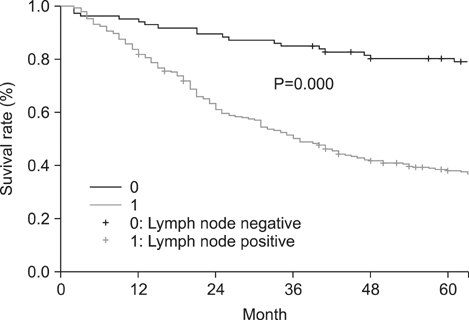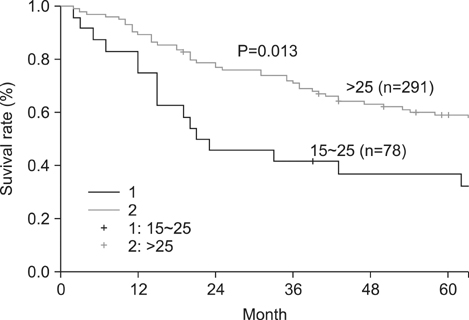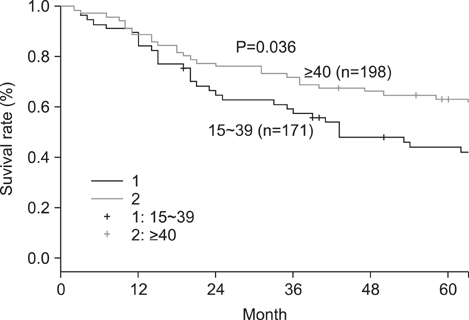J Gastric Cancer.
2014 Jun;14(2):111-116.
Does the Retrieval of at Least 15 Lymph Nodes Confer an Improved Survival in Patients with Advanced Gastric Cancer?
- Affiliations
-
- 1Department of Surgery, Ewha Womans University School of Medicine, Seoul, Korea. kimyi@ewha.ac.kr
Abstract
- PURPOSE
The standard surgical procedure recommended to treat gastric cancer in advanced cases is dissection of D2 lymph nodes (LNs). However, the optimum number of LNs that should be retrieved in advanced gastric cancer (AGC) remains debatable. Therefore, this study aimed to investigate the optimum number of retrieved LNs and determine the clinical implications of retrieved LN numbers on the treatment of AGC.
MATERIALS AND METHODS
Of 575 AGC patients reviewed, 369 who underwent open curative gastrectomy with D2 or more extensive LN dissection at our institution were analyzed according to their clinicopathologic characteristics and number of LNs retrieved.
RESULTS
Multivariate regression analysis revealed that tumor size (P=0.006), depth of invasion (P=0.000), LN metastasis (P=0.000), and stage (P=0.000) were independent variables with predictive value. The 5-year survival rates were differed significantly according to the numbers of LNs retrieved ([1] 15~25 vs. >25 and [2] 15~39 vs. > or =40) in patients with differentiated carcinoma.
CONCLUSIONS
Tumor size, depth of invasion, LN metastasis, and stage were independent predictive factors for survival. The number of retrieved LNs was significantly associated with a long-term survival benefit in patients with differentiated carcinoma. Therefore, our data suggest that the retrieval of a minimum of 15 LNs may not be sufficient to warrant a recommendation for further curative surgery and that extensive LN dissection should be considered in advanced carcinoma of the differentiated type.
Keyword
Figure
Reference
-
1. Sobin LH, Wittekind Ch, editors. TNM classification of malignant tumors. 5th ed. New York: Wileys-Liss;1997.2. Japanese Gastric Cancer Association. Japanese Classification of Gastric Carcinoma - 2nd English Edition. Gastric Cancer. 1998; 1:10–24.3. Baiocchi GL, Tiberio GA, Minicozzi AM, Morgagni P, Marrelli D, Bruno L, et al. A multicentric Western analysis of prognostic factors in advanced, node-negative gastric cancer patients. Ann Surg. 2010; 252:70–73.
Article4. Chen XZ, Yang K, Zhang B, Hu JK, Zhou C. Is retrieval of >25 lymph nodes a superior criterion for locally advanced gastric cancer surgery? Ann Surg. 2011; 254:834–835.
Article5. Smith DD, Schwarz RR, Schwarz RE. Impact of total lymph node count on staging and survival after gastrectomy for gastric cancer: data from a large US-population database. J Clin Oncol. 2005; 23:7114–7124.
Article6. Hundahl SA, Phillips JL, Menck HR. The National Cancer Data Base Report on poor survival of U.S. gastric carcinoma patients treated with gastrectomy: fifth edition American Joint Committee on Cancer staging, proximal disease, and the "different disease" hypothesis. Cancer. 2000; 88:921–932.
Article7. Ajani JA, Bentrem DJ, Besh S, D'Amico TA, Das P, Denlinger C, et al. National Comprehensive Cancer Network. Gastric cancer, version 2. 2013: featured updates to the NCCN Guidelines. J Natl Compr Canc Netw. 2013; 11:531–546.8. Baxter NN, Tuttle TM. Inadequacy of lymph node staging in gastric cancer patients: a population-based study. Ann Surg Oncol. 2005; 12:981–987.
Article9. Sobin LH, Witteking Ch, editors. TNM: classification of malignant tumor. 6th ed. New York: Wiley-Liss;2002.10. Bouvier AM, Haas O, Piard F, Roignot P, Bonithon-Kopp C, Faivre J. How many nodes must be examined to accurately stage gastric carcinomas? Results from a population based study. Cancer. 2002; 94:2862–2866.
Article11. Shen JY, Kim S, Cheong JH, Kim YI, Hyung WJ, Choi WH, et al. The impact of total retrieved lymph nodes on staging and survival of patients with pT3 gastric cancer. Cancer. 2007; 110:745–751.
Article12. Edge SB, Compton C, Fritz A, Greene F, Trotti A, editors. AJCC Cancer Staging Handbook. 7th ed. New York: Springer;2010.13. Bunt AM, Hermans J, van de Velde CJ, Sasako M, Hoefsloot FA, Fleuren G, et al. Lymph node retrieval in a randomized trial on western-type versus Japanese-type surgery in gastric cancer. J Clin Oncol. 1996; 14:2289–2294.
Article14. Wu CW, Hsiung CA, Lo SS, Hsieh MC, Chen JH, Li AF, et al. Stage migration influences on stage-specific survival comparison between D1 and D3 gastric cancer surgeries. Eur J Surg Oncol. 2005; 31:153–157.
Article15. Roukos D, Lazaros A, Kappas A, Encke A. Extended lymph node dissection in gastric cancer induces substantial stage migration and increases stage-specific survival without improvement of overall survival. J Clin Oncol. 1996; 14:2408–2410.
Article16. Sun Z, Zhu GL, Lu C, Guo PT, Huang BJ, Li K, et al. The impact of N-ratio in minimizing stage migration phenomenon in gastric cancer patients with insufficient number or level of lymph node retrieved: results from a Chinese mono-institutional study in 2159 patients. Ann Oncol. 2009; 20:897–905.
Article17. Yasuda K, Adachi Y, Shiraishi N, Inomata M, Takeuchi H, Kitano S. Prognostic effect of lymph node micrometastasis in patients with histologically node-negative gastric cancer. Ann Surg Oncol. 2002; 9:771–774.
Article18. Kim JH, Park JM, Jung CW, Park SS, Kim SJ, Mok YJ, et al. The significances of lymph node micrometastasis and its correlation with E-cadherin expression in pT1-T3N0 gastric adenocarcinoma. J Surg Oncol. 2008; 97:125–130.
Article19. Jeong JY, Kim MG, Ha TK, Kwon SJ. Prognostic factors on overall survival in lymph node negative gastric cancer patients who underwent curative resection. J Gastric Cancer. 2012; 12:210–216.
Article20. Cho BC, Jeung HC, Choi HJ, Rha SY, Hyung WJ, Cheong JH, et al. Prognostic impact of resection margin involvement after extended (D2/D3) gastrectomy for advanced gastric cancer: a 15-year experience at a single institute. J Surg Oncol. 2007; 95:461–468.
Article
- Full Text Links
- Actions
-
Cited
- CITED
-
- Close
- Share
- Similar articles
-
- Greater Lymph Node Retrieval Improves Survival in Node-Negative Resected Gastric Cancer in the United States
- Influence of Nodal Yields on Staging of Gastric Cancer and on Survival
- Extensive Lymph Node Dissection Improves Survival among American Patients with Gastric Adenocarcinoma Treated Surgically: Analysis of the National Cancer Database
- Is retrieval of at least 15 lymph nodes sufficient recommendation in early gastric cancer?
- Proposal of the Nodal Stage Based on the Number of Metastatic Lymph Nodes in Patients with Gastric Cancer




